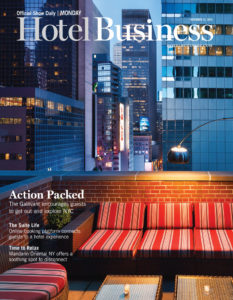 Are the penalties for those who violate short-term rental laws in NYC high enough? The Impulsive Group Founder and CEO Hank Freid doesn’t think so. Hotel Business caught up with the NYC real estate mogul to find out where he’s taking his 20-year-old hospitality company in 2017. His expansion plans include breaking into warmer climates, somewhere with palm trees lining the coast.
Are the penalties for those who violate short-term rental laws in NYC high enough? The Impulsive Group Founder and CEO Hank Freid doesn’t think so. Hotel Business caught up with the NYC real estate mogul to find out where he’s taking his 20-year-old hospitality company in 2017. His expansion plans include breaking into warmer climates, somewhere with palm trees lining the coast.
We all hear about curated experiences, authenticity and personal touchpoints. What are some of the signature elements tying your properties together? Each property is individualized, other than service. We try to give the same service at a four-star resort as we do at a three-star resort. As far as theme or the physical aspects of the properties, there’s nothing really tying them together. Each one is independent.
How does The Impulsive Group stand out among its competitors? We have a very, very good culture—as far as our employees are concerned. When we’re hiring, we hire people who will fit into that culture. We hire based on personality. That personality spreads out to dealing with our clients, vendors, customers and everybody else. People really enjoy dealing with us in that respect. As far as consumers going to our properties, our main effort is really on servicing the client. We try to do that better than anybody else. I think that’s what brings us so much repeat business.
With the rise of alternative accommodations such as Airbnb, how are you staying competitive? Our properties run on different levels. I don’t think my high-end properties are really affected by Airbnb. I don’t think my corporate clients would go ahead and stay in someone else’s apartment or anything like that. As far as service, I think lower-level hotels are more affected by Airbnb than higher-level properties. I don’t think someone who is going to stay at the Plaza or my Sanctuary Hotel would go to an Airbnb.
You’re in New York and your hotels are here, too. Let’s talk about the hot topic in the news now: Governor Cuomo’s regulation of Airbnb in NY. Thoughts? I don’t think the fines are high enough. In Miami, the fines are $30,000. In New York, they’re going to be $7,500. I think industry-wise, whether it’s affecting me or not affecting me, it’s a good thing.
The increasing role of OTAs has a direct impact on hotels. What are some initiatives you’ve taken to keep pace with the growth of online booking alternatives? I think that when you have a guest who does come in through an OTA, the thing is to try to have that guest come back directly to you. You can offer that guest a better deal if they deal with you directly because you’re not paying commission to the OTA. I think that when you have a guest who stays and enjoys the experience, you try to get that guest to come back directly.
You typically like to do a lot of conversions. What attracts you to this type of project? The time element. Doing something from the ground up takes a lot more time than going into an existing building and doing the renovations and building. Sometimes, people refer to me that immediate gratification is not quick enough for me, so it’s really going into the project and completing that project quicker.
Are we at a point where there’s too much supply in the NY market? What’s your take on current market conditions in NY? We’re overloaded with hotel rooms. Other people I know in the industry have decided to reconsider and go into residential rather than doing hotels in some of the locations. Same thing is happening in Miami. Miami has an oversaturation of a lot of hotels coming on the market. I guess it’s good for the consumer because the consumer gets a cheaper price, but I think it’s going to lack overall as far as service is concerned because you have a bigger overhead and you’re getting less money.
You’ve been in New York real estate for more than 30 years. What are some of the major changes you’ve seen? When I first started out, there really wasn’t much competition. There just weren’t that many people coming to New York. That’s been increasing, increasing and increasing. New York has become a much safer place than it was 30 years ago. The strength of the euro caused more Europeans to come to New York and the United States, as well. Now that you don’t have the euro being as strong, you lost a lot of that. The technology is completely different. I don’t think there was yielding in those days. You had your rates. You didn’t necessarily change them two or three times a week or two or three times a day. I think that the technology has been the major change.
How does The Impulsive Group give back to the community/local neighborhoods? We’re always cooperative with community boards with regard to complying with things they’re asking for and things they need. We’re doing a project on the Lower East Side, and the community board there is very concerned about what we’re doing. There have been times where we’ve allowed community boards to have meeting space if they needed it. We try to work hand-in-hand with them. We were negotiating something downtown on the Lower East Side and the community board was concerned with too many being in the area. We met with them and tried to make them feel comfortable with what was going on. We tried to make adjustments where they felt adjustments needed to be made.
What are your plans for The Impulsive Group in the upcoming year? How do you plan to grow the company in 2017 and beyond? We’re always looking in New York, and I think there are going to be a lot of opportunities in New York in the coming year and the year after. I feel like a lot of hotels will not be able to sustain the situation with the influx of all of the additional rooms. I think that purchase prices of hotels are going to come down. A lot of times, hotels are purchased on the price per room. We’re also looking outside of the New York area. We’re looking into Miami. We’re also looking outside the country. HB

